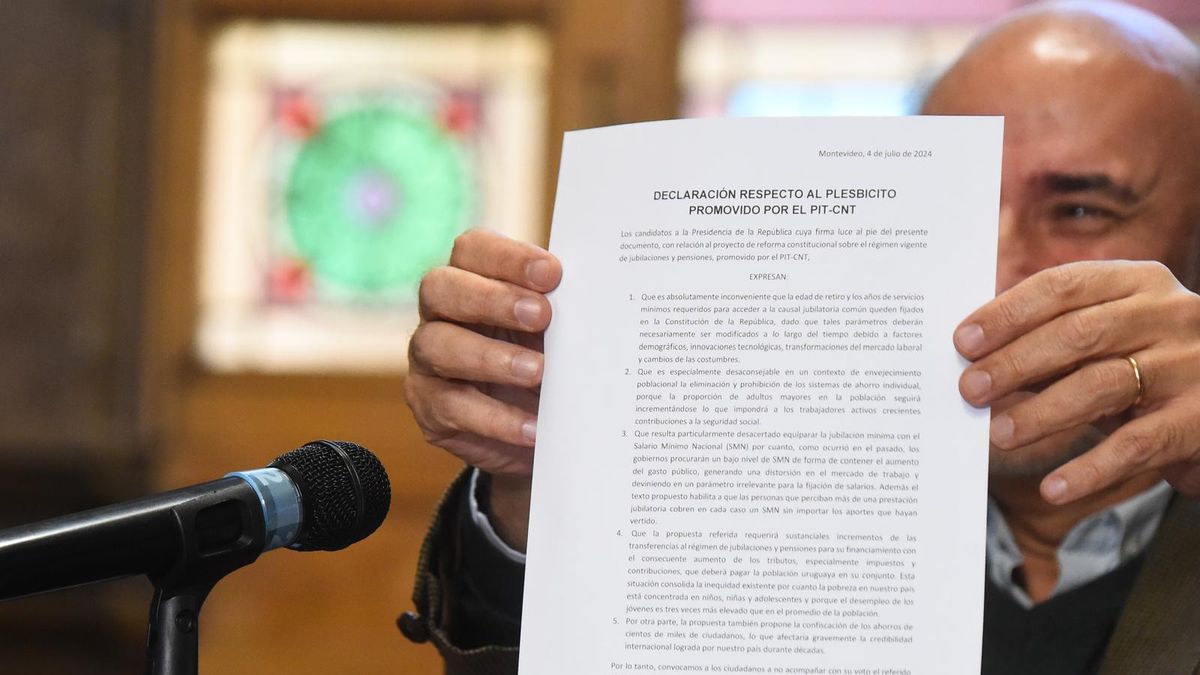He plebiscite against social security reform driven by the PIT-CNT and enabled a few days ago by the Electoral Court is shaping up to be the big issue for at least the first part of the electoral campaign in October. In this regard, the coalition candidates signed a commitment against the Constitutional reform proposed by the trade union, while the latter defended it.
In it Legislative Palace, and promoted by the candidate of the Independent Party and former minister of Labor and Social Security (MTSS) Pablo Mieres, Álvaro Delgado, Andrés Ojeda and Guido Manini Rios —along with Mieres himself— called for not supporting the plebiscite. To do so, they signed a declaration of five against the initiative that seeks to reform the Constitution in pension matters under popular consultation.
What does the text of the declaration say?
The first point of the text signed by the candidates of the governing coalition states that it is “absolutely inconvenient that the retirement age and the minimum years of service required to access the common retirement cause be fixed in the Constitution of the Republic“.
“Such parameters will necessarily have to be modified over time due to demographic factors, technological innovations, transformations in the labour market and changes in customs,” it says.
In fact, the rigidity of the system that its introduction into the Constitution would mean is one of the main criticisms, especially after the data of the 2023 Census which gave an account of the population aging that is already being experienced Uruguay.
This was expressly stated in point number two of the text, which also added that “the proportion of older adults in the population will continue to increase, which will force active workers to make recent contributions to social security”; therefore “the elimination and prohibition of individual savings systems” is “especially inadvisable”.
Likewise, for the coalition candidates, “it is particularly wrong to equate the minimum retirement with the Minimum salary National (SMN) “because, as has happened in the past, governments will seek to keep the level of MN low in order to contain the increase in public spending, generating a distortion in the labour market and becoming an irrelevant parameter for setting wages.”
In point four, they also stressed that the initiative “will require substantial increases in the transfers to the retirement and pension system for its financing with the consequent increase in taxes.” In particular, taxes and contributionswhich will have to be paid by the Uruguayan population as a whole.
“This situation consolidates the existing inequality because the poverty In our country, it is concentrated in children and adolescents and because youth unemployment is three times higher than the average of the population,” the text stated, referring to the high levels of child poverty in the country.
Finally, he stresses that the proposal also raises the “confiscation of savings of hundreds of thousands of citizens, which would seriously affect the international credibility “achieved” by Uruguay during decades.
The defense of the PIT-CNT
For its part, the union spoke about the economic points surrounding the plebiscite proposal, in a press conference after the confirmation of the signatures. There, the president of the PIT-CNT, Marcelo Abdala, He rejected the negative warnings being made by sectors of the government and some on the left regarding the fiscal impact of the reform.
According to him, there is “a study of the Center for Economic Research (Cinve) which says that for the next 20 years our initiative will not have any kind of negative fiscal impactbut we have reached the technical conclusion (…) that the financial assistance needs future, after these first 20 years, has to do with an amount of 460 million dollars of financial assistance, after these first 20 years.”
For its part, the Broad Front ratified the “freedom of action” for all its sectors while the candidate Yamandú Orsidespite disagreeing with the plebiscite, refused to sign the declaration proposed by Mieres, as he also disagrees with the social security reform implemented by the government.
Source: Ambito




